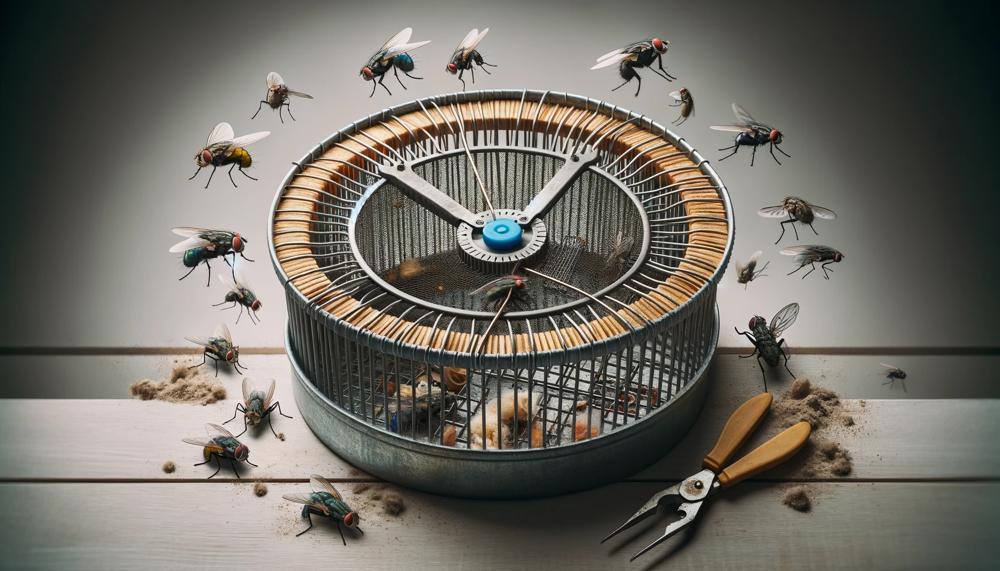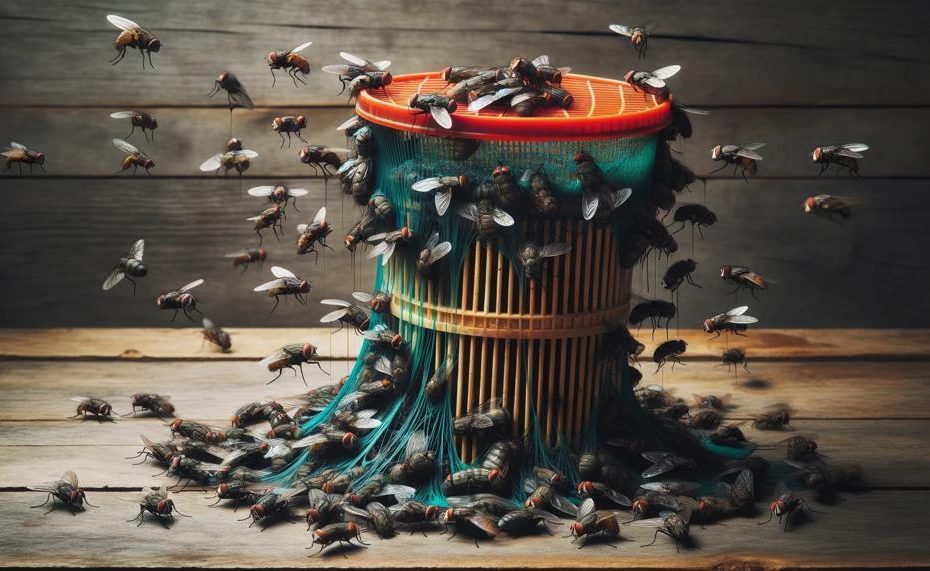Whether you’re dealing with sticky paper, electric zappers, or bait traps, getting rid of them the right way is crucial for maintaining a clean and safe environment. Today, we’re diving into the nitty-gritty of fly trap disposal, offering you practical tips and insights to ensure you handle this task with care and efficiency.
So, how do you dispose of fly traps safely?
You may securely dispose of a fly trap by placing it in a zip-lock bag, then enclosing the bag in a plastic shopping bag, and finally discarding it. This may aid in avoiding leaks and unpleasant odors.
Alternatively, you might let the trap dry up or store it in a sealed container and discard it. You may use a kitchen-sized (13-gal) or somewhat bigger rubbish bag if you choose to discard the contents. Prior to taking off the top and emptying the contents, lower the trap all the way to the interior of the bag.
If you’d like, you may also burn the trap. You may pick an outside location, such as a dedicated compost pile or garden patch, that is apart from the living and eating areas for ecologically friendly disposal.
Let’s get started.
Contents
How to Dispose of Fly Traps
Disposing of fly traps requires care to safeguard both human health and our environment.

| Trap Type | Disposal Method | Additional Notes |
| Disposable | Wrap, Seal, Dispose | Consider double-bagging to contain odors. |
| Liquid | Bury or Compost Liquid | Ensure to bury away from home to avoid attracting more pests. |
| Reusable | Clean, then Bury/Burn Contents | Clean trap with enzyme cleaner before disposal. |
Remember, while fly traps are handy in keeping pests at bay, disposing of them responsibly ensures we’re not trading one problem for another.
Cleaning Up a Fly Trap Spill
To safely clean up a spilled fly trap, follow these precise steps:
| Step | Action | Details |
| 1 | Protective Gear | Wear gloves and a mask |
| 2 | Clean Up | Use paper towels to remove debris |
| 3 | Disinfect | Apply and wipe with disinfectant spray |
| 4 | Dispose | Seal and double-bag contaminated materials |
| 5 | Aftercare | Wash hands and discard protective gear |
| 6 | Prevention | Store fly traps securely |
Things To Remember
When it comes to ridding your home of buzzing nuisances with fly traps, you’ve tackled half the battle. The other half? Making sure you ditch these traps without harm to you, your family, or the environment.
- Wear Gloves: First things first, slap on some gloves. You’re handling items doused in chemicals and potentially full of germs from the caught flies.
- Seal It Up: Before you even think of tossing it in the bin, make sure the fly trap is sealed in a plastic bag. This keeps any harmful substances contained and prevents them from contaminating other items.
- Cool Down: If you’ve used a method that involves burning, let any containers cool off. We’re avoiding any fire hazards or burns here.
- Choose Your Bin Wisely: Not all trash is created equal. A fly trap, especially one that’s not completely used up, should go in your general household waste, not recycling. Recycling facilities aren’t equipped to handle them, and you don’t want to cause more issues.
- Water Works: Got a bit of the trap left and thinking of flushing it or burying it? Add water first. This dilutes any chemicals, making them safer for the soil or sewer.
Things To Remember
When you’re getting rid to chuck those fly catchers, there’s a bit more to it than just tossing ’em in the bin. Here’s the skinny on keeping things safe and sound:
- Handle With Care: Fly traps are no picnic to deal with. They’re often sticky as all get-out and might be packing chemicals you wouldn’t want on your skin. So, glove up before you go touching them.
- Proper Disposal: Don’t just throw these sticky blighters in the trash willy-nilly. Seal them up tight in a bag or container. This keeps any of the wee beasties that are still kicking from making a break for it.
- Safe Storage: Got kiddos or furry friends roaming about? Keep these traps out of paw and hand’s reach. You don’t want them getting their mitts on something that could harm them.
- Don’t Mix and Match: Mixing fly traps with other cleaners is a recipe for disaster. You might end up with a concoction that’s more trouble than it’s worth.
- Follow the Rules: Every trap comes with its own set of do’s and don’ts. Give them a read to avoid any mishaps.
Conclusion
Fly trap disposal is more than simply a housekeeping chore—it’s an essential part of keeping a safe, healthy atmosphere. This guide has cleared the way for ethical disposal by providing specific guidance for different sorts of traps, ranging from simple adhesive strips to intricate baited and electrical devices. The need to close traps before disposal to avoid escape or spillage, the need to wear protective clothing to defend oneself from toxins, and the environmental consideration of selecting the appropriate disposal method—whether it be burying, composting, or binning—are among the most important lessons learned.
When we consider these activities, we see a greater dedication to the ecosystem as a whole, not simply to our local surroundings. Even though it’s a simple process, putting a spent trap in a plastic bag highlights a more important message of care and confinement. It’s a sign of respect for the effectiveness of the traps and the potential threats they may pose once they fulfill their intended purpose. Comparably, the advice to bury or compost certain kinds of traps demonstrates a sustainable way of thinking, transforming what was once a need for pest management into a chance to improve our planet.
Remember, as we get to the end of our journey, that every step you take to get rid of fly traps—from putting on gloves to doing the last binning—is one step closer to a world that is safer and cleaner.





